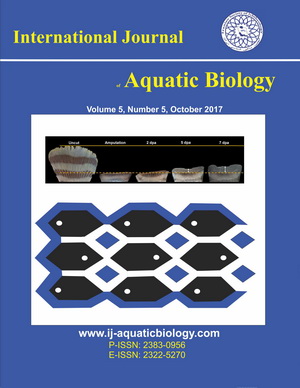Assessment of suitability of macrobenthic mollusc diversity to monitor water quality and shallow sediment quality in a tropical rehabilitated and non-rehabilitated wetland system
Downloads
Six sampling sites were selected to represent different land use types in the rehabilitated and non-rehabilitated areas of a recreational wetland in Sri Lanka to study the suitability of macrobenthic mollusc diversity to monitor spatial and temporal variation in physico-chemical parameters of water and shallow sediments. Individuals belonging to six families and eight species were recorded during the study. The significantly highest mean abundance (individuals) of Bithynia tentaculata and Pila globosa were recorded in sites from the rehabilitated area and there was no significant temporal variation of mollusc abundance during the study. The abundance and diversity of mollusc community showed significant spatial variations and this study identified that B. tentaculata and P. globosa can be used as possible bioindicators to detect changes in water and shallow sediment quality in tropical wetland ecosystems
Downloads
Abel P.D. (1989). Water Pollution Biology. 2nd ed. Ellis Horwood, Chichester, UK.
Badruzzaman A.B.M., Bari M.F., Alam M.S., Hoque M.M., Habib M.E., Saha M. (2007). Effects of thermal effluent discharge on the macroinvertebrate abundance in the Sitalakhya River in Bangaladesh. In: Proceedings of the Scientific Conference; Rivers of the Hindu-Kush Himalaya-Ecology and Environmental Assessment, pp: 113.
Barbour M.T., Gerritsen J., Snyder B.D., Stribling J.B. (1999). Rapid bioassessment protocols for use in streams and wadeable rivers: Periphyton, benthic macroinvertebrates and fish, 2nd ed. U.S. Environmental Protection Agency; Office of Water; Washington, D.C.
Bartsch M.R., Newton T.J., Allran J.W., O'Donnell J.A., Richardson W.B. (2003). Effects of pore"water ammonia on in situ survival and growth of juvenile mussels (Lampsilis cardium); in the St. Croix Riverway, Wisconsin, USA. Environmental Toxicology and Chemistry, 22(11): 2561-2568.
Begon M., Townsend C.R., Harper J.L. (2006). Ecology: from individuals to ecosystems. 4th ed. Wiley-Blackwell, USA.
Bode R.W., Novak M.A., Abele L.E. (1996). Quality assurance work plan for biological stream monitoring in New York State. NYS Department of Environmental Conservation, Albany, NY. 89 p.
Bode R.W., Novak M.W., Abele L.E. (1991). Methods for rapid biological assessment of streams. Stream Biomonitoring Unit, Bureau of Monitoring and Assessment, Division of Water, NYS Dept. of Environmental Conservation. 57 p.
Bonada N., Prat N., Resh V.H., Statzner B. (2006). Developments in aquatic insect
biomonitoring: a comparative analysis of recent approaches. Annual Review of Entomology, 51: 495-523.
CEA (2001). Proposed Ambient Water quality Standards for Inland Waters in Sri Lanka. Colombo, Sri Lanka: Environment Action Project (Funded by ADB).
Choubisa S.L. (1992). Molluscs as bio-indicators for the trophic stages of lakes and lotic environments. Bulletin of Pure and Applied Science, 11: 35-40.
Clarke A.H. (1979). Gastropods as indicators of trophic lake stages. Nautilus, 94: 138-142.
Dahanayaka D.D.G.L., Wijeyaratne M.J.S. (2006). Diversity of macrobenthic community in the Negombo estuary, Sri Lanka with special reference to environmental conditions. Sri Lanka Journal of Aquatic Science, 11: 43-61.
Dharmasoma U.Y.I.L., Piyadasa R.U. (2014). An Assessment of seasonal variation water quality in the inlets of Diyawannawa Lake, Sri Lanka. In: Proceedings of the SAITM Research Symposium on Engineering Advancements. pp: 110-112.
Feio M.J., Almeida S.F.P., Craveiro S.C., Calado A.J. (2007). Diatoms and macroinvertebrates provide consistent and complementary information on environmental quality. Fundamental and Applied Limnology, 169: 247-258.
Fernando C.H., Weerawardhena S.R. (2002). A guide to the fresh water fauna of Ceylon (Sri Lanka). A reprint of A.S. Mendis and C.H. Fernando (1962) with a forward, a check list of Amphibians of Sri Lanka and selected references on freshwater fauna. 2nd ed. Department of Fisheries, Sri Lanka. 173 p.
Gamlath G.A.R.K., Wijeyaratne M.J.S. (1997). Indicator organism of environmental conditions in a lotic water body in Sri Lanka. Sri Lanka Journal of Aquatic Science, 2: 121-129.
Hartmut F., Gerstmann S. (2007). Declining populations of freshwater pearl mussels (Margaritifera margaritifera) are burdened with heavy metals and DDT/DDE. Ambio, 36(7): 571-574.
Hellawell J.M. (1986). Biological indicators of freshwater pollution and environmental management. 1st ed. Elsevier, London. 518 p.
Hilsenhoff W.L. (1988). Using a biotic index to evaluate water quality in streams. Tech. Bull. No 132 Wisconsin Department of Natural Resources.
Idroos F.S., Manage P.M. (2012). Aquatic life health quality assessment of the Bolgoda Canal
and Waga Stream with respect to selected physico-chemical parameters and bioindicators.
Journal of Tropical Forestry and Environment, 2(2): 13-26.
Jacobson P.J., Farris J.L., Cherry D.S., Neves R.J. (1993). Juvenile Frshwater mussel (Bivalvia, Uninoidae) responses to acute toxicity testing with copper. Environmental Toxicology and Chemistry, 12: 879-883.
Kazi T.G., Arain M.B., Jamali, M.K., Jalbani N., Afridi H.I., Sarfraz R.A., Baig J.A., Shah A.Q. (2009). Assessment of water quality of polluted lake using multivariate statistical techniques: A case study. Ecotoxicology and Environmental Safety, 72(2): 301-309.
Kolodziejczyk A. (1984). Occurrence of Gastropoda in the lake littoral and their role in the production and transformation of Detritus 1. Snails in the Littoral of Mikolajskie Lake- General Characteristics of Occurrence. Polish Journal of Ecology, 32(3): 441-468.
Mereta S.T., Boets, P., De Meester L., Goethals P.L.M. (2013). Development of a multimetric index based on benthic macroinvertebrates for the assessment of
natural wetlands in Southwest Ethiopia. Ecological Indicators, 29: 510-521.
Moloukhia H., Sleem S. (2011). Bioaccumulation, fate and toxicity of two heavy metals common in industrial wastes in two aquatic Molluscs. Journal of American Science, 7(8): 459-464.
Páez-osuna P., Frias-espericueta M.G., Osunalópez J.I. (1995). Trace metal concentrations in relation to season and gonadal maturation in the oyster Crassostrea iridescens. Marine Environmental Research, 40(1): 19-31.
Plafkin J.L., Barbour M.T., Porter K.D., Gross S.K., Hughes R.M. (1989). Rapid bioassessment protocols for use in streams and rivers: benthic macroinvertebrates and fish. EPA.
Riget F., Johansen P.., Asmund G. (1997). Uptake and release of lead and zinc by blue mussels. Experience from transplantation experiments in Greenland. Marine Pollution Bulletin, 34(10): 805-815.
Savage A.A., Gazey G.M. (1987). Relationships of physical and chemical conditions to species diversity and density of gastropods in English lakes. Biological conservation, 42(2): 95-113.
Shuhaimi-Othman M., Nur-Amalina R., Nadzifah Y. (2012). Toxicity of metals to a freshwater snail, Melanoides tuberculata. The Scientific World Journal, 1-10.
Triest L., Kaur P., Heylen S., De Pauw N. (2001). Comparative monitoring of diatoms, macroinvertebrates and macrophytes in the Woluwe River (Brussels, Belgium). Aquatic Ecology, 35(2): 183-194.
Turkmen M., Turkmen A., Akyurt I., Tepe Y. (2005). Limpet, Patella caerulea Linnaeus, 1758 and barnacle, Balanus sp., as biomonitors of trace metal availabilities in Iskenderun Bay, northern east Mediterranean sea. Bulletin of Environmental Contamination and Toxicology, 74(2): 301-307.
Yuzereroglu T.A., Gok G., Cogun H.Y., Firat O., Aslanyavrusu S., Maruldali O., Kargin F. (2010). Heavy metals in Patella caerulea (mollusca, gastropoda) in polluted and non-polluted areas from the Iskenderun Gulf (Mediterranean Turkey). Environmental Monitoring and Assessment, 167: 257-264.








